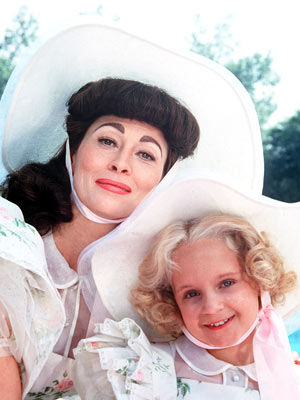I can’t imagine who would want to subject themselves to this movie. “Mommie Dearest” is a painful experience that drones on endlessly, as Joan Crawford’s relationship with her daughter, Christina, disintegrates from cruelty through jealousy into pathos. It is unremittingly depressing, not to any purpose of drama or entertainment, but just to depress. It left me feeling creepy.
The movie was inspired, of course, by a best-selling memoir in which adopted daughter Christina Crawford portrayed her movie-star mother as a grasping, sadistic, alcoholic wretch whose own insecurities and monstrous ego made life miserable for everyone around her. I have no idea if the book’s portrait is an accurate one, but the movie is faithful to it in one key sense: It made life miserable for me.
“Mommie Dearest” repeats the same basic dramatic situation again and again. Baby Christina tries to do the right thing, tries to be a good girl, tries to please Mommie, but Mommie is a manic-depressive who alternates between brief triumphs and long savage tirades, infecting her daughter with resentment and guilt. In scene after scene, we are invited to watch as Joan Crawford screams at Christina, chops her hair with scissors, beats her with a wire coat hanger and, on an especially bad day, tackles her across an end table, hurls her to the carpet, bangs her head against the floor, and tries to choke her to death. Who wants to watch this?
This material is presented essentially as sensationalism. The movie makes no attempt to draw psychological insights from the life of its Joan Crawford, not even through the shorthand Freudianism much beloved by Hollywood. Mommie is a monster, that’s all, and there’s some mention of her unhappy childhood. Christina is a brave, smiling, pretty, long-suffering dope who might inspire more sympathy if she were not directed (in both her childhood and adult versions) to be distant and veiled.
The movie doesn’t even make narrative sense. Success follows crisis without any pattern. At one moment, Joan is in triumph after winning the Oscar for “Mildred Pierce.” In the very next scene she goes so berserk we want to scrape her off the screen with a spatula. The scenes don’t build, they just happen. Another example: After an especially ugly fight, Joan sends Christina to a convent school. There’s a scene where the mother superior welcomes her and promises to reform her. One scene later, Christina checks out of the school, and the nun wishes her godspeed. No mention of what happened in the school, how it affected Christina, or whether the nun changed her opinion of the girl.
The movie also offers few insights into Crawford’s relationships with others. There’s a loyal housekeeper, but never a scene where Crawford speaks personally with her. There is a lover and a third husband, both enigmas. Crawford’s acting career is treated mostly in ellipses. The sets look absolutely great, Faye Dunaway’s impersonation of Crawford is stunningly suggestive and convincing, and little Mara Hobel, as Baby Christina, handles several difficult moments very well. But to what end? “Mommie Dearest” is a movie that knows exactly how it wants to look, but has no idea what it wants to make us feel.



















